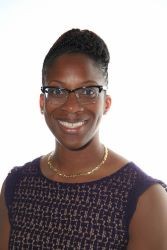How was this content?
Shining a light on Black excellence: three founders share their stories
To celebrate Black History Month, AWS Startups is featuring posts throughout February highlighting the contributions of Black builders and leaders in tech. Above all, these individuals inspire, empower, and encourage others—especially those historically underrepresented in tech—to prove what’s possible.
Today, we’re talking to three Black founders and leaders: Kwame Boler, CEO and co-founder of Spritz Natasha Greene, We Intervene; and Chandler Malone, CEO of Bootup.
These Black leaders and innovators are making impacts in their communities, industries, and beyond.

Read on to see how they’ve overcome obstacles and how they encourage and mentor young Black founders in tech and beyond.
Kwame Boler is the CEO and co-founder of Spritz, the full-service app for residential cleaners to handle paperwork, stay organized, and earn more.

Q: Tell me about some of the obstacles you’ve faced as a founder. What did you learn about yourself as you confronted them?
A: As a founder, I’ve faced many challenges along the way. One of the biggest obstacles I experienced was when my previous business, neu, had to shut down and pivot to become Spritz. At the time, it was a low point for our team, but we didn’t let it defeat us.
We started neu with just $3,000 of funding from friends, and by the end of 2019, we bootstrapped the business to generate nearly $400,000 in gross merchandise value (GMV) in just one city. In 2020, our goal was to close our first round of venture capital while participating in the Techstars accelerator and expand to other markets. But, unfortunately, when the travel industry took a nosedive from the pandemic, our plans had to change. However, we saw this as an opportunity to clear our technical debt, and after making the tough decision to furlough our operations team, we continued building and increasing our product-market fit by including personal protection equipment (PPE) in our service offerings. Despite the circumstances, we successfully closed our first round of venture capital that year. We were now on our way to scale, and by the end of 2021, we had doubled our lifetime GMV to nearly $900,000 in sales and expanded into our 2nd market.
However, while raising our next venture round, our most significant challenge came when our lead investor failed to wire funds at the last minute despite several reassurances and a binding commitment.
Consequently, we had to lay off 90% of our team and reevaluate our plan. It was a tough time, but in 2022, we eventually pivoted to Spritz, a SaaS platform that simplifies the complexity of managing the back office for residential cleaners. We spent most of last year doing customer discovery and market research, and by October, we were pleasantly surprised to see nearly 4,000 people had signed up for our waitlist in anticipation of our product launch. Despite our hardships, I am incredibly grateful for the team that helped us get to where we are today.
These experiences taught me that sometimes, the hardest problems could be blessings in disguise.
Q: What advice do you have for young founders who want to start their own company?
A: For those ready to embark on the exciting journey of starting your own company, here are the top 5 lessons I’ve learned along the way:
Despite the challenges, bear markets can be the best time to build a company.
- My top tip for building a successful team is to leverage tools like LinkedIn to source talent and surround yourself with people you know, love, and trust, who have complementary expertise to yours. Then, take a good hard look at your strengths and weaknesses, and seek out individuals who can complement those and bring different skills to the table. Building a strong, cohesive team is the foundation of a successful company.
- Next, please don’t quit your day job (… yet). Moonlighting can be a game-changer and an excellent opportunity to test your entrepreneurial skills, validate your business idea, build a savings nest egg, and prepare for success. By dedicating your evenings to your passion project, you’ll stay focused and motivated and won’t lose your day job security. This way, when the time comes to quit your day job, you can fully concentrate on your startup without worrying about money.
- Then, before you dive into building your product, it’s crucial that you spend time researching the market and validating your assumptions with customer feedback. This will help avoid blind spots and ensure you’re building with your customers in mind.
- Also, understand that your net worth is your network. Building a successful startup takes a community, just like raising a child takes a village. Put yourself and your idea out there by attending as many startup networking events as possible. Build relationships and surround yourself with like-minded individuals who have experience and can give you the right advice. Leverage a network of advisors and potential investors to help you filter the noise and make efficient decisions.
- Finally, please remember to prioritize self-care as well. Starting a company is a marathon, not a sprint, and it’s essential to pace yourself and be kind to yourself and your team. It’s okay to take a step back and celebrate your wins — just be sure to maintain open lines of communication with your team and investors.
With a lot of hard work, determination, and a little luck, you can also build a successful company.

Natasha Greene is the founder and CEO of We Intervene, which provides a centralized repository of resources along with Real-Time Virtual Resource Assistants to better help schools connect families to resources they need and want 24/7.

Q: Tell me about some of the obstacles you’ve faced as a founder. What did you learn about yourself as you confronted them?
A: I delivered a stillborn baby on December 1st. Her name was Jurni. My stillbirth was a big emotional and physical setback as a woman in tech who wants to have a family. I wrote about it on LinkedIn.
I learned that community could help me to get through almost anything. For example, I could continue building out the security requirements for We Intervene because of Audree, whom I met in AWS Reach. She became my part-time virtual chief information security officer (VCISO) and helped oversee development and milestones to move our product through development for a big meeting we had in February while I work on healing over the death of my daughter.
Staying patient is also an obstacle. Some sectors are slow to realize the potential of your product, and you have to keep on educating others on the impact your product will have. And you have to keep on reminding yourself why you decided to take this entrepreneurial journey and remember the impact you want to have. Many people see the “quick” successes, but it wasn’t quick at all; there were many days between the startup phase and the first purchase stage. There are many more days between the startup phase and the exit or even grossing millions of dollars phase. The key is always patience – patience with yourself and all those around you.
Q: What advice do you have for young founders who want to start their own company?
A: You need to go out there and start the project/business you’re thinking about doing. But first, start by testing your assumptions on the idea you have. For example, if you want to start a TikTok marketing company, then you need to do it for free for a couple of people and get their feedback on your work.
Or, your “free” time can be tons of projects you have completed. Then, you take your positive testimonies or reviews to the next group, who will pay. And then there is another group that will pay you more as you become better at your craft. Always work on getting to clarity on what you are offering and who you are offering to – we don’t want to say you are for everyone when you really want to focus on solopreneurs.
Also, know that the first company might not be the thing you run with. It might take a couple of companies. So, you might talk to an accountant about the best business structure you should do to house all your ideas.
If I had to do entrepreneurship again, I would have done an S-corp in the beginning and then d.b.a. all my business ideas under that idea instead of starting an LLC for each idea I have. I wasted a lot of money on business structure and taxes.

Chandler Malone is a three-time entrepreneur who is now building Bootup, an educational labor marketplace that helps individuals get their first jobs in the technology sector regardless of their educational background, while helping companies fill their talent pipeline problems through access to pre-qualified talent.

Q: Tell me about some of the obstacles you’ve faced as a founder. What did you learn about yourself as you confronted them?
A: One of the most difficult things that no one tells founders about is building and growing a strong team. As a startup, the capital we raised definitely gave us flexibility, but we still can’t compete with big tech companies on salary, benefits, and resources.
One of my greatest strengths is my ability to be resourceful and think out of the box for solutions. This resulted in building out a fully distributed, in house engineering team across Bolivia and Venezuela. We were able to hire the most experienced engineers and within our budget.
In 2023 and onward, managers should be focused on understanding the best ways to source and ration top talent globally. We are no longer confined to specific geographies teams who can find and keep the best people no matter where they are located will succeed in the long run.
Building our team has also pushed me to become a stronger listener, more perceptive, and trust my gut more.
Q: What advice do you have for young founders who want to start their own company?
Don’t get caught up in the hype and stay focused on running your race. You’ll see some founders always in the press or out at conferences – and good for them!
Your job isn’t to emulate what other founders are doing or get the validation of VCs and the press. At the end of the day you are running a business, and anything that isn’t focused on better serving customers is a distraction.
Conclusion
We’ll let Kwame take us out with a final question.
Q: What makes you excited about or gives you hope for the future of Black-owned and led startups?
A: The incredible progress I’ve seen over recent years gives me hope for the future of Black-owned and led startups. We’re now seeing more and more Black founders getting access to resources and capital and a growing community of supporters helping to blaze the trail for others to follow.
The ecosystem is evolving, and with a combination of intentional actions and continued success stories, I’m confident we’re moving toward a brighter future for Black entrepreneurs. Of course, systemic issues won’t change overnight, but it’s inspiring to see the progress already made.
I’m particularly excited about the rise in Black-led funds, which reduce the perceived risk of investing in Black founders. And with access to wealth increasing among Black people, we’re going to see even more Black entrepreneurs taking their ideas to the next level.
In the tech community, we often expect change to happen as quickly as writing a line of code. But we’re learning that some issues are systemic and deeply rooted. However, the progress being made and the quality of the founders getting access to resources gives me confidence that, over time, more founders of color will get the opportunities they deserve.

Tiffany Johnson
As a highly esteemed Global Business Development Manager on the AWS Startups underrepresented founders (URF) business development (BD) team, Tiffany Johnson brings a wealth of experience and expertise to her role. Originally from Guyana, South America, Tiffany is a driving force behind the creation and leadership of programs that provide support for underrepresented founders. She is renowned for her invaluable contributions to the Amazon family for over six years, most notably as the mastermind behind Amazon's groundbreaking $150M Black Business Accelerator. In addition to her professional work, Tiffany dedicates her time to serve her community as a Board Member of the United Way of King County. When she's not working, she enjoys exploring the world with her family and immersing herself in different cultures.
How was this content?